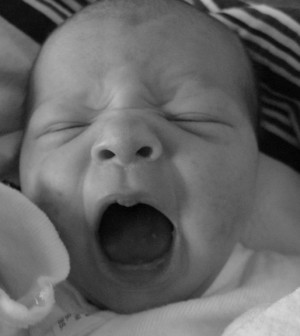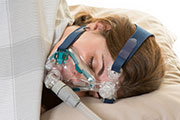- Could Your Grocery Store Meat Be Causing Recurring UTIs?
- Are You Making This Expensive Thermostat Error This Winter?
- Recognizing the Signs of Hypothyroidism
- 10 Strategies to Overcome Insomnia
- Could Artificial Sweeteners Be Aging the Brain Faster?
- Techniques for Soothing Your Nervous System
- Does the Water in Your House Smell Funny? Here’s Why
- Can a Daily Dose of Apple Cider Vinegar Actually Aid Weight Loss?
- 6 Health Beverages That Can Actually Spike Your Blood Sugar
- Treatment Options for Social Anxiety Disorder
Sleep Apnea ‘CPAP’ Masks Might Help Ease High Blood Pressure


A small new study suggests that the “CPAP” breathing devices used by sleep apnea patients can make a major, rapid and beneficial difference in blood pressure and the stiffness of arteries.
Just three months of treatment with CPAP (continuous positive airway pressure) devices lowered both systolic and diastolic blood pressures — the top and bottom numbers on a blood pressure reading– and also decreased arterial stiffness, the study found.
However, the improvements vanished within a week when patients stopped using the devices, the study authors noted.
Sleep apnea, characterized by frequent interruptions in nighttime breathing, has long been linked to increased heart risks.
“We are more and more recognizing the importance of sleep apnea in patients with treatment-resistant hypertension,” said Dr. Sripal Bangalore, a heart specialist and associate professor of medicine at NYU Langone Medical Center, New York City. He was not involved in the new research.
However, the new study suggests that sleep apnea’s effect on blood pressure is “reversible if treated early in the disease process,” lead researcher Dr. Claudia Korcarz, manager and senior scientist at the University of Wisconsin Atherosclerosis Imaging Research Program in Madison, said in a statement provided by the American Academy of Sleep Medicine.
The study subjects were 47 adults with an average age of 41 who’d recently been diagnosed with sleep apnea.
CPAP devices work by pushing pressurized air into the nose. This inrush of air prevents muscles in the throat from closing and cutting off breathing during sleep. Without the device, people with sleep apnea may subconsciously wake up to breathe dozens of times per hour.
The devices are unwieldy, however, and many sleep apnea patients find them difficult to tolerate. Ten of the 47 subjects couldn’t manage to use the devices for at least four hours a night. The rest averaged six hours of use a night.
Bangalore said he wasn’t surprised by the findings. “In clinical practice we see a reduction in blood pressure in such patients with CPAP use, when the patients are seemingly resistant to antihypertensive medications,” he noted.
“The biggest take home message is that snoring does not indicate sound sleep and using CPAP and being compliant with it can potentially prevent adverse cardiovascular [effects],” Bangalore said.
The research is scheduled to be presented on Wednesday at the annual meeting of the Associated Professional Sleep Societies. The study has not yet gone through the peer review process that’s typically required of research before it’s published in a medical journal.
More information
There’s more on sleep apnea at the National Sleep Foundation.
Source: HealthDay
Copyright © 2026 HealthDay. All rights reserved.










